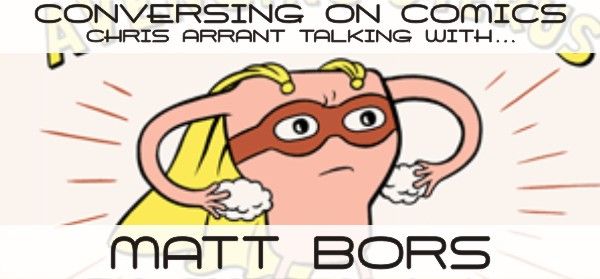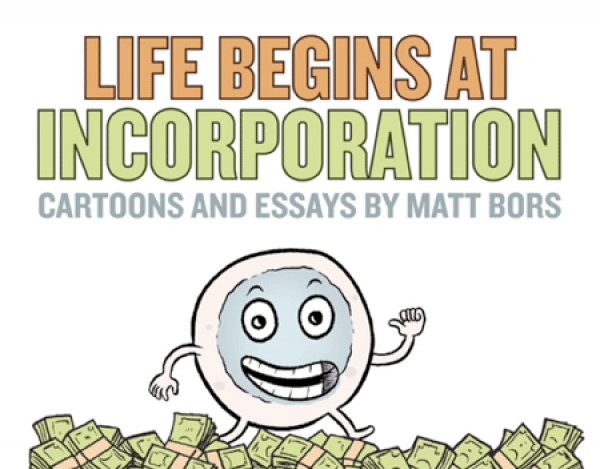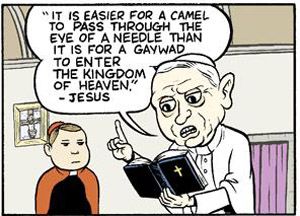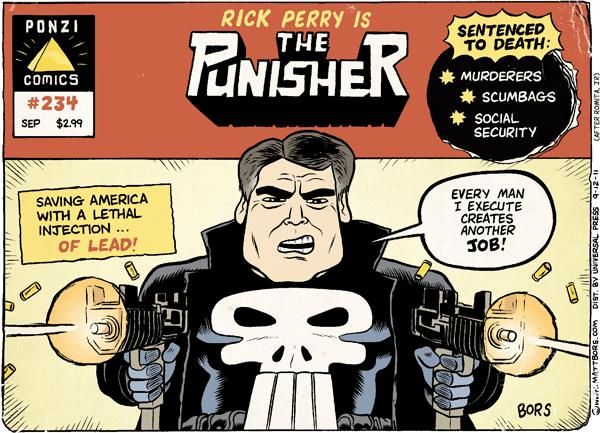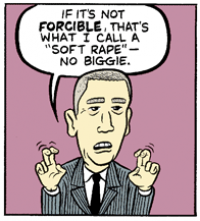It seems every time Superman, Spider-Man or any comics character steps near a political issue it becomes front-page news, not just on Comic Book Resources but in mainstream publications like USA Today. But politics and comics aren't that unfamiliar to each other -- in fact, they cross paths every day in editorial cartoons and comic strips. And one of the strongest and most popular voices in modern editorial cartooning is Portland, Oregon-based cartoonist Matt Bors. A 2012 Pulitzer Prize finalist, Bors can be read regularly nationwide in independent papers, as well as on Daily Kos and, of course, his own website.
It's a busy time of year for Bors, as he just launched a Kickstarter campaign to fund the first collection of his editorial cartoons and essays under the banner Life Begins At Incorporation: Cartoons & Essays By Matt Bors. He's taking time away from his post as comics journalism editor at Cartoon Movement and moving forward with more projects of his own. I talked to him about his career, his thoughts on the industry, and the perceived divide between comic books and editorial cartoons.
Chris Arrant: You told me you just got back from an out-of-town trip and are just now getting back to drawing. What are you working on today, Matt?
Matt Bors: Today was all over the place. I rolled out a new website design that I'm trying to work the kinks out of, put the final touches on an animation I did called The Avenging Uterus, attempted to write some comics, and have been pulling together a Kickstarter campaign for a collection of my comics.
Here at CBR and Robot 6, we're primarily focused on the comic book market and not so much on political cartooning or comics journalism, per se. I wanted to bring you in to try to expand that, but first off: What do you think of this divide that seems to exist in the world of comics between comic books, comic strips and political cartoons?
I'm not sure I understand why it exists, if it indeed does. But I guess I do see it. A lot of editorial cartoonists I know are very ensconced in the world of daily papers and editorial cartoons and have no idea what's going on in comics – no idea at all about some of the best graphic novels out there or who Jason Aaron is or anything. Then there's political cartoons, which don't seem to of interest to a lot of people who are really into comics and comics culture.
I couldn't tell you why comic reading habits seem so fractured. Imagine something like that with prose, where newspapers readers and novel readers rarely overlapped. Just newspapers, please! No other kinds of words!
In your interview with Tom Spurgeon about two years back, it struck me that you said as a child you read comics -- but primarily Marvel and Image, specifically mentioning Rob Liefeld at one point. I browbeat myself for thinking someone can't have diverse interests, so can you give me your perspective on how your reading habits then influenced at all your decision to do comics in the form you do them now?
When I was 10, "penciler of the X-Men" was my only life goal. After that it was having my own underground series like Zap and Eightball, but that whole model seemed to be on the way out by the time I got around to seriously thinking about it in college. I never paid attention to editorial cartoons until I was doing them myself. They weren't really on my radar until I had something to say politically, then it became what I was doing with my career all of the sudden. Not because of any long-standing interest in the field, but because I was into doing comics, period. So when I had something political to say, it only followed that I would say it in comics.
Long -form comics has always been a passion of mine, but I just sort of fell into this thing where I was doing political cartoons and loving it. You get that instant feedback from publishing a few times a week, especially online, and it keeps you going. And I guess you do something that's about what's happening now in the world and it makes the work feel relevant, or at least timely. I think it's easier, mentally, than doing a long graphic novel. I've only taken a stab at it once with War Is Boring. It was a short book compared to a lot of comics out there, but I found the workload grueling and wanted to quit comics by the time I finished. Then a week later I wanted to do another one.
You said you “fell into” doing political cartoons, going away from your intentions to do long-form comics. What was it that pulled you in and made you stay in political cartoons?
Part of it is that I'm very political and it served as a serious outlet for my frustrations during the George W. Bush years. You have to remember what it was like back then. If you had qualms about where America was going in 2003, you were anti-American. The government was invading Iraq, gutting laws, establishing frightening new ones. The country had lost its mind, and there was new things every weak screaming to be made fun of. It seemed like we would never come back from the edge. (In some ways we haven't.)
I really like having work out there every week and being a part of someone's routine. You draw these things for years and you start to leave a trail behind you, a history of the cray cray in America, you might say.
A few hundred cartoons in I gained some confidence in pumping these things out week after week. I could do it well and was slowly picking up clients so I stuck with it, and there was this cascading effect of getting syndicated, picking up some prominent outlets, so just kept going. Now that I'm established I so want to branch out a bit more in coming years.
Pouncing on that -- do you have any substantial plans yet for your next long-form comic?
No, nothing I'd call substantial. I plan on doing some freelance over the next year – short pieces on subjects that interest me and seeing if over the course of time a subject really strikes me in a way that I want to do something long with it. Doing a book-length work in comics is a real endeavor, so I'm not in any rush to settle on something.
What was your first memory of reading a political/editorial cartoon and realizing the distinction between it and comics?
I don't think I ever had that realization. We're talking words and pictures here, so it's all the same to me. That's why I gravitated more to the alt-weekly style of political cartooning. Words. Pictures. Speech balloons. Comics. Traditional editorial cartooning never resonated with me because of tendency to have metaphorical illustrations with labels on them. It's probably the only genre in comics with its own internal language; sinking ships, cars going over cliffs, elephants in the room, etc. Don't get me wrong, there are some people who do that really well (you usually by avoiding the cliches I pointed out there), but I prefer more straightforward comics: what is happening on the page is supposed to be actually happening.
I've worked at newspapers and know several other editorial cartoonists, and it's been an in joke between me and them about how bad news is good fodder for their work. As both a person and a professional, do you wish there was no bad news - or would that force you to alter what you spoke about?
How could there ever be zero bad news? What would that be – stories about people getting business loans, finishing school, and legislators making perfectly salient points? I don't like it. Doesn't make good cartoon fodder. More importantly, it's completely impossible in a world run by humans and I bet robots couldn't do much better.
I don't like the fact that the world is run be a revolving cast of douche bags, but I do like cartooning about it! I like addressing reality, the way things are, without sugar coating them. Satire is a way to stay sane amid all this. There will never be no bad news, thankfully, which is about the only thing editorial cartooning has going for it at the moment.
Speculate wildly here. what would be better for you, in terms of fodder for comics - Romney wins or Obama wins?
Maybe Romney. He's corporate pitch man right out of a movie, a true one-percenter, completely incapable of relating to most of the people he'd govern. ("Who let the dogs out?") That's the president were kind of supposed to have, really. It's easier to go after Romney, though I'm kind of bored with him already.
When Democrats do horrible things like bomb brown villagers with drones, liberals are more willing to look the other way. They become much more attuned to outrages against human decency – shockingly – when a Republican is in office. So in that way, more readers may enjoy me beating up on R-Money. I try not to pull punches with anyone though. Obama's a failure on a lot of levels and I'm not really that into his centrist fetish or above-the-fray aloofness, but he's more likable than Romney, which makes characterizing him a bit trickier.
You do two to three cartoons a week, plus blogging about the news and organizing work over at Cartoon Movement. With all of that, what is your news-gathering routine like?
Constant. I pretty much take in news all day long. At this point, I wouldn't even say I have particular news sources I go to – it's more Twitter. Twitter is my friend. It allows me to follow every news outlet on earth while also getting an appropriate amount of juvenile humor. It's sort of integrated into my writing process at this point. Interacting with people, making jokes about the news – you're forced to write for an audience then and there, and there's been more than a few times where I'll put something out, look at it, and go, "Oh, that's my next comic!"
Prior to this you told me you recently concluded your work at Cartoon Movement. Is that right?
Well, I'm sort of in limbo right now in regards to that gig. We have some pieces in the pipeline that I'm finishing up editing, but I was told a few months ago not to commission anything new due to the budget drying up. We make money selling reprints of our political cartoons and the like, but it isn't enough yet to account for all our operating costs.
Tjeerd and the guys who own the site have been really good at getting money thus far, so I'm holding out hope, but I'm also laying plans for that not to be the case. Cartoon Movement has been about half my work week for two years and I've got a money and time gap to fill in. That was the main impetus for my Kickstarter. I want the site to continue, but either way I'm making sure there's a book collection of the comics journalism we published there over the last two years.
What do you think are the big positive things going on now in editorial cartooning and comics journalism?
The only thing positive in editorial cartooning is the work being done. I think we're in a time where some of the best work is being created, it's just having trouble finding a paying home. Comics journalism on the other hand has a brighter future, if only because it has nowhere to go but up. A few years ago it was treated as a novelty thing Joe Sacco did. Now you have an entire field, albeit relatively small, that is doing some incredible work. I'm thinking Wendy McNaughton, The Illustrated Press Chicago, Erin Polgreen at Symbolia. I think five years from now you're going to see a good foot of bookshelf space filled up with some serious works from the people working in this field.
Susie Cagle was recently hired by grist.org as a staff reporter, where some of her work will be done in cartoon form. That's absolutely unprecedented. I hope it has a ripple effect in normalizing this sort of work so editors aren't so reticent to pay for it. Comics are popular(and Not Just For Kids Anymore) but some of them still haven't got the memo.
On the flip side, what are the things you're personally concerned about the industry you work in?
As long as we are keeping the whole concept of money around as a society, I'm deeply worried about earning enough. Look, staff editorial cartoonists are still being axed left and right. We have yet to hit the level of staffers that we will never exceed again. Who knows how low that number is. Forty? Five? There will always be some, but there aren't many people getting in this field anymore. I'm the last Association of American of Editorial Cartoonists member in their 20s. Either I have the entire field to myself or I made a mistake on Career Day.
Truth is, I make very little money from the comics. We're all kind of hanging on until some workable model for The Future of Journalism takes root. The old staff model at a paper is dead, but I don't see why it should be at websites. They hire enough writers you'd think a cartoonist could get in the mix everyone once in a while. It's not like images do really well at being shared on the internet or anything. In my brighter moments, I have hope that the dam will break at some point.
Through Cartoon Movement you've helped foster a stronger range of comics journalism online not just in the U.S. but all over the country. How do you see comics journalism fitting in beside traditional reporting for text, radio and video?
We're seeing more comics journalist incorporating audio, links, and other multimedia work into pieces. There are tools available now that make this so much easier than it used to be, like ThingLink. And honestly I don't know how to do this stuff myself, but I've been proud to publish people like Dan Carino and Luke Radl, who have done some pretty amazing things with multimedia comics. These are some of the first pieces like this ever to be published (toots his own horn) so we're only seeing the initial stages of what can be done.
Everyone used to make fun of USA Today's obsession with infographics and pictures all over their front page. Now every news site looks like that. I can't speak to USA Today's level of journalism, but they were on to something with the pie charts. People click on images. They share comics and infographics. In a world where everything is competing for you attention online, I think a comic can hold it as well or better than a text piece. Part of the future of news is realizing this and embracing it.
And how do you think the rise of infographics as a journalistic device intersects with political and informative cartooning?
For a long time I think "serious" news outlets sort of looked down on infographics. The internet has completely flipped a lot old media assumptions on their head and now what is every news outlet and non-profit doing? Putting out infographics to be shared around the web. Images just do well on sites like Facebook and Tumblr, which are designed to keep you inside the site. Hell, people even slap quotes on pictures of Gandhi and they fly around in a way they wouldn't as simple text.
Online there are a lot of things competing for your attention and images, memes, comics – they are pithy and shareable in a way articles are not. Longer work, comics journalism, I think is more engaging. You look at the Haiti piece we published on Cartoon Movement. You are immediately placed there, seeing it for yourself, in a way that a prose article can't do. What I'm saying is, this interview should have been done entirely in meme form.
I've started experimenting with political cartoons that operate more like memes. Jokes I would normally throw out on Twitter, I'll lay out in text with an image of, say, Mitt Romney and throw it out there. These days political satire is out there fast – Twitter parodies and Tumblrs are going within minutes. I'm trying to stay on my game and good material out there as quick as I can.
You've done two fairly well-documented foreign trips for research -- Afghanistan in 2010 and Haiti in 2011. Do you have more field expeditions like this planned in the near future?
I don't have any trips planned at the moment, but I'm going to continue to travel outside the U.S. with comics journalism in mind, eventually doing my own books.
I've loved working at Cartoon Movement and hope it can continue. (Funding is always an issue.) I got to put money in the hands of creators whose work I thought deserved wider recognition – and we paid well! A number of books are in the works from projects that began with us. If there's any downside for me in this it's simply that editing the site took a lot of time and prevented me from doing any of my own comics journalism. That's something I'm going to be getting to in the long run. I'll keep doing the editorial cartoons, but long form non-fiction work is an itch I've been waiting to scratch for a while.
Speaking of itches, I have to ask one last question about your recent foray into animation with The Avenging Uterus. How did that spring about, and what are your intentions with it? Is animation something you could see yourself doing more of?
The animator, Jeremy Joseph, approached me earlier this year and asked if I'd be interested in animating my work. It's always something I've thought about, but never wanted to learn myself. I had started using the Avenging Uterus in my comics, my first true recurring character, while we were talking about collaborating and it was immediately clear I needed to use her. I didn't want to wing it or do it half-assed so I hired Jeremy, a sound guy, and voice actors, and I'm real happy with how it turned out. I'd love to do more of these. There's at least eight other Avenging Uterus animations in my head, but animation is even more time-consuming and expensive than comics.
There's a few long shot possibilities I'm working on right now to finance this, one of which includes a web tv network, but it's too early to say. For me the most important part was getting this out of the idea phase and into reality and saying "here's what I can do" and seeing what flows from there.
Next Friday, Conversing On Comics returns with an intense, elaborate and just plain wordy interview with comics writer Jamie S. Rich. Rich worked his way up from old school letter column hack to editor and comics writer, and is one of American comics' most trenchant writers, carving a path of comics with heart, soul, and a couple of dead bodies along the way. The Portland-based author is currently writing It-Girl & The Atomics for Image and recently finished a prose novella about a young woman living the life of a comics editor. Come back Nov. 2 to read that interview!

